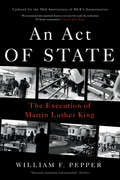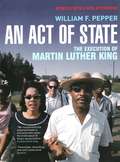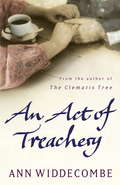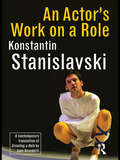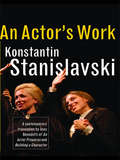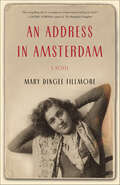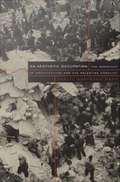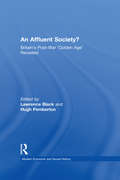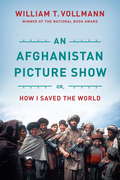- Table View
- List View
An Act of Love: A Novel
by Carol DrinkwaterHiding from Nazis in the French Alps, a teenage girl is torn between love and safety in this &“exciting, evocative&” novel by the international bestselling author (Daily Mail). Jews fleeing Poland in 1943, Sara and her family are hiding from the horrors of World War II in a house in the mountains in France. Sara is enjoying the beauty of her surroundings, the temporary respite from danger—and her blossoming romance with the villager Alain. But the Germans remain a looming and ever-present menace. When that threat becomes too close for comfort, Sara&’s parents decide it is time to move on again, hoping to reach Italy and, finally, Palestine. However, Sara wants only to remain with Alain—a harrowing choice that will mean not only parting from her mother and father but joining the fight waged by the French Resistance and risking her life for love and freedom. &“A moving story of love and friendship with a wonderful sense of place.&” —Kate Mosse, bestselling author of Labyrinth &“Carol Drinkwater&’s writing is like taking an amazing holiday in book form.&” —Jenny Colgan, New York Times–bestselling author of The House at the Edge of the Cliff
An Act of State: The Execution Of Martin Luther King
by William F. PepperOn April 4 1968, Martin Luther King was in Memphis supporting a workers’ strike. By nightfall, army snipers were in position, military officers were on a nearby roof with cameras, and Lloyd Jowers had been paid to remove the gun after the fatal shot was fired. When the dust had settled, King had been hit and a clean-up operation was set in motion-James Earl Ray was framed, the crime scene was destroyed, and witnesses were killed. William Pepper, attorney and friend of King, has conducted a thirty-year investigation into his assassination. In 1999, Loyd Jowers and other co-conspirators were brought to trial in a civil action suit on behalf of the King family. Seventy witnesses set out the details of a conspiracy that involved J. Edgar Hoover and the FBI, Richard Helms and the CIA, the military, Memphis police, and organized crime. The jury took an hour to find for the King family. In An Act of State, you finally have the truth before you-how the US government shut down a movement for social change by stopping its leader dead in his tracks.
An Act of State: The Execution of Martin Luther King
by William F. PepperMartin Luther King Jr was a powerful and eloquent champion of the poor and oppressed in the US, and at the height of his fame in the mid-sixties seemed to offer the real possibility of a new and radical beginning for liberal politics in the USA. However,in 1968, he was assassinated; the movement for social and economic change has never recovered. The conviction of James Earl Ray for his murder has never looked even remotely safe, and when William Pepper began to investigate the case it was the start of a twenty-five year campaign for justice. At a civil trial in 1999, supported by the King family, seventy witnesses under oath set out the details of the conspiracy Pepper had unearthed: the jury took just one hour to find that Ray was not responsible for the assassination, that a wide-ranging conspiracy existed, and that government agents were involved. An Act of State lays out the extraordinary facts of the King story--of the huge groundswell of optimism engendered by his charismatic radicalism, of how plans for his execution were laid at the very heart of government and the military, of the disinformation and media cover-ups that followed every attempt to search out the truth. As shocking as it is tragic, An Act of State remains the most compelling and authoritative account of how King’s challenge to the US establishment led inexorably to his murder.
An Act of State: The Execution of Martin Luther King
by William PepperMartin Luther King Jr was the most powerful and eloquent champion of the poor and oppressed in US history, and at the height of his fame in the mid-sixties seemed to offer the real possibility of a new and radical beginning for liberal politics in the USA. In 1968, he was assassinated; the movement for social and economic change has never recovered. The conviction of James Earl Ray for his murder has never looked even remotely safe, and when William Pepper began to investigate the case it was the start of a twenty-five year campaign for justice. At a civil trial in 1999, supported by the King family, seventy witnesses under oath set out the details of the conspiracy Pepper had unearthed: the jury took just one hour to find that Ray was not responsible for the assassination, that a wide-ranging conspiracy existed, and that government agents were involved. An Act of State lays out the extraordinary facts of the King story—of the huge groundswell of optimism engendered by his charismatic radicalism, of how plans for his execution were laid at the very heart of government and the military, of the disinformation and media cover-ups that followed every attempt to search out the truth. As shocking as it is tragic, An Act of State remains the most compelling and authoritative account of how King’s challenge to the US establishment led inexorably to his murder.
An Act of Treachery
by Ann Widdecombe'A tale of illicit love, hate and loss in occupied France . . . confirming [Ann Widdecombe] as an eloquent storyteller' GLASGOW HERALDCatherine Dessin, a young French girl living in Paris during the occupation, falls for an older, married German officer. The novel examines the tensions this causes within her family of patriots and resistance workers. Meanwhile Klaus, the German officer, who is Oxford educated and a professed Anglophile, faces his own moral dilemma as he comes to realise, through his love for Catherine and a tragedy in his own family, the true nature of the regime he is serving.'A gripping read' SUNDAY EXPRESS 'Widdecombe is to be applauded for the range of her ambition within this book: the admirably large cast of characters is well-handled, their dilemmas are believable and the narrative makes for compulsive reading' THE TIMES
An Act of Villainy: An Amory Ames Mystery (An Amory Ames Mystery #5)
by Ashley WeaverEdgar Award-shortlisted author Ashley Weaver returns with the fifth installment in the Amory Ames mystery series. An Act of Villainy is an a gem, set in 1930s London and filled with style, banter, and twists that traditional mystery fans will positively relish."So you've gotten yourself involved with another murder, have you?"Walking through London’s West End after a night at the theater, Amory Ames and her husband Milo run into wealthy investor and former actor Gerard Holloway. Holloway and his wife Georgina are old friends of theirs, and when Holloway invites them to the dress rehearsal of a new play he is directing, Amory readily accepts.However, Amory is shocked to learn that Holloway has cast his mistress, actress Flora Bell, in the lead role. Furthermore, the casual invitation is not what it seems—he admits to Amory and Milo that Flora has been receiving threatening letters, and he needs their help in finding the mysterious sender. Despite Amory’s conflicting feelings—not only does she feel loyalty to Georgina, but the disintegration of the Holloways’ perfect marriage seems to bode ill for her own sometimes delicate relationship—her curiosity gets the better of her, and she begins to make inquiries.It quickly becomes clear that each member of the cast has reason to resent Flora—and with a group so skilled in the art of deception, it isn’t easy to separate truth from illusion. When vague threats escalate, the scene is set for murder, and Amory and Milo must find the killer before the final curtain falls.Also out now in the Amory Ames mysteries: Murder at the Brightwell, Death Wears a Mask, A Most Novel Revenge, and The Essence of Malice.
An Actor Survives: Remarks on Stanislavsky (Routledge Advances in Theatre & Performance Studies)
by Tomasz KubikowskiThis book focuses on the analysis and interpretation of the first volume of the book An Actor’s Work by Konstantin Stanislavsky. This volume is the only part of his planned major work on theatre art that he was able to finish and authorise before his death. Its highly edited variant has long been known as ‘An Actor Prepares’ in the English-speaking world. Tomasz Kubikowski explores Stanislavsky’s material not only as a handbook of acting but also as a philosophical testament of Stanislavsky, in which he attempts to contain his most essential experiences and reflections. This book explores the underlying theme of ‘survival’ in its various meanings, from professional to existential; and the mechanisms and actions we attempt to survive. This study will be of great interest to students and scholars in theatre and performance studies.
An Actor's Work on a Role
by Konstantin StanislavskiAn Actor’s Work on a Role is Konstantin Stanislavski’s exploration of the rehearsal process, applying the techniques of his seminal actor training system to the task of bringing truth to one’s chosen role. Originally published over half a century ago as Creating a Role, this book was the third in a planned trilogy – after An Actor Prepares and Building a Character, now combined in An Actor’s Work – in which Stanislavski sets out his psychological, physical and practical vision of actor training. This new translation from renowned scholar Jean Benedetti not only includes Stanislavski’s original teachings, but is also furnished with invaluable supplementary material in the shape of transcripts and notes from the rehearsals themselves, reconfirming 'The System' as the cornerstone of actor training.
An Actor's Work: A Student's Diary
by Konstantin StanislavskiStanislavski’s ‘system’ has dominated actor-training in the West since his writings were first translated into English in the 1920s and 30s. His systematic attempt to outline a psycho-physical technique for acting single-handedly revolutionized standards of acting in the theatre. Until now, readers and students have had to contend with inaccurate, misleading and difficult-to-read English-language versions. Some of the mistranslations have resulted in profound distortions in the way his system has been interpreted and taught. At last, Jean Benedetti has succeeded in translating Stanislavski’s huge manual into a lively, fascinating and accurate text in English. He has remained faithful to the author's original intentions, putting the two books previously known as An Actor Prepares and Building A Character back together into one volume, and in a colloquial and readable style for today's actors. The result is a major contribution to the theatre, and a service to one of the great innovators of the twentieth century.
An Address in Amsterdam: A Novel
by Mary Dingee FillmoreA Kirkus Indie Book of the Month Winner, Sarton Women's Book Award for Historical Fiction When the Germans invade her city, Rachel Klein is a teenager falling in love. Within a year, she's delivering illegal papers and confronting Nazi soldiers. In this “compelling and touching tale” (Laurel Corona), Rachel finds her courage and faces wrenching choices. Follow Rachel Klein as she faces double danger as a young Jewish woman and resistance worker in the Amsterdam of Anne Frank. On May 10, 1940, the Nazi bombers blast the night and shatter Rachel Klein's sleep—along with her life as she knew it. She's eighteen, and falling in love with a Gentile in a secret relationship. As the Nazi terror escalates, her romance deepens quickly, and so does her boyfriend's involvement with student protests. Soon, he must disappear rather than face arrest. When Rachel witnesses the first roundup of 425 Jewish men in the Jonas Daniel Meijerplein, she knows that she too must act, and joins the resistance. Despite the ever greater danger as the Nazis tighten their grip on the city, Rachel makes daily deliveries of illegal papers to addresses all over Amsterdam. She ingeniously evades the Nazis and their Dutch collaborators for months, although she has some close calls. As the roundups intensify, Rachel agonizes about whether to go into hiding. Ultimately she persuades her parents to accompany her to a dank basement, where she gets to know herself and them in a different way, and meets a new man. A young woman can find her courage in any situation, no matter how terrible, and love is always a possibility.
An Address in Paris: Emplacement, Bureaucracy, and Belonging in Hostels for West African Migrants (Black Lives in the Diaspora: Past / Present / Future)
by Aïssatou Mbodj-PouyeAfter West African migrants arrived in France in the 1960s, the authorities opened residences for them known as “foyers.” Initially intended to contain the West African population, these hostels for single men fostered the emergence of Black communities in the heart of Paris and other cities. More recently, however, a nationwide renovation program sought to replace the collective living arrangements of foyers with more individualized spaces by constructing new buildings or drastically reshaping existing ones—and casting the West African presence as a threat to French identity.Aïssatou Mbodj-Pouye examines the changing roles that foyers have played in the lives of generations of West African migrants, weaving together rich ethnographic description with a critical historical account. She shows how migrants settled in foyers through kinship ties, making these buildings key parts of diasporic networks. Migrants also forged a sense of place in foyers, in an intricate relationship with bureaucratic requirements such as having an address. Mbodj-Pouye scrutinizes the physical and social evolution of foyers and the administrative dynamics that governed them. She argues that even though these buildings originated in state attempts to manage migrants along racial lines, the shared way of life that they encouraged helped spark a sense of political agency and belonging whose significance extends far beyond their walls.Combining close attention to the social and cultural meanings of the foyers and keenly observed portraits of Black experiences in France across decades, An Address in Paris offers a new lens on the global African diaspora.
An Aesthetic Occupation
by Daniel Bertrand MonkIn An Aesthetic Occupation Daniel Bertrand Monk unearths the history of the unquestioned political immediacy of "sacred" architecture in the conflict between Palestinians and Israelis. Monk combines groundbreaking archival research with theoretical insights to examine in particular the Mandate era--the period in the first half of the twentieth century when Britain held sovereignty over Palestine. While examining the relation between monuments and mass violence in this context, he documents Palestinian, Zionist, and British attempts to advance competing arguments concerning architecture's utility to politics. Succumbing neither to the view that monuments are autonomous figures onto which political meaning has been projected, nor to the obverse claim that in Jerusalem shrines are immediate manifestations of the political, Monk traces the reciprocal history of both these positions as well as describes how opponents in the conflict debated and theorized their own participation in its self-representation. Analyzing controversies over the authenticity of holy sites, the restorations of the Dome of the Rock, and the discourse of accusation following the Buraq, or Wailing Wall, riots of 1929, Monk discloses for the first time that, as combatants looked to architecture and invoked the transparency of their own historical situation, they simultaneously advanced--and normalized--the conflict's inability to account for itself. This balanced and unique study will appeal to anyone interested in Israel or Zionism, the Palestinians, the Middle East conflict, Jerusalem, or its monuments. Scholars of architecture, political theory, and religion, as well as cultural and critical studies will also be informed by its arguments.
An Affair Before Christmas (Desperate Duchesses #2)
by Eloisa JamesMagic under the mistletoe . . . One spectacular Christmas, Lady Perdita Selby, known to her friends and family as Poppy, met the man she thought she would love forever. The devilishly attractive Duke of Fletcher was the perfect match for the innocent, breathtakingly beautiful young Englishwoman, and theirs was the most romantic wedding she had ever seen. Four years later, Poppy and the duke have become the toast of the ton . . . but behind closed doors the spark of their love affair has burned out. Unwilling to lose the woman he still lusts after, the duke is determined to win back his beguiling bride's delectable affections . . . and surpass the heady days of first love with a truly sinful seduction.
An Affair Before Christmas: A Sexy and Unputdownable Regency Romance Book
by Eloisa Jamesfont size="+1">'Nothing gets me to a bookstore faster than Eloisa James' Julia Quinn, bestselling author of Bridgertons The second book in the New York Times bestselling Desperate Duchesses series, perfect for fans of Julia Quinn's Bridgertons and Eloisa's Wildes of Lindow Castle'Choc-full of romantic heroes romantic heroes that would give Darcy a run for his money.' Carole MatthewsOne spectacular Christmas, Miss Perdita 'Poppy' Selby met the man she thought she would love forever. The devilishly attractive Duke of Fletcher was everything a convent-educated girl wished for in a suitor, and their wedding day was perfect. Unfortunately, no one had quite prepared Poppy for what would happen next. Four years later, Poppy and the duke have become the toast of London society, but behind closed doors the spark of their love affair has burned out. Fortunately, Poppy has a friend in Jemma, the Duchess of Beaumont. Jemma, who is toying with another man herself, reveals to Poppy a world of strategy and desire that will change Poppy's whole outlook on love forever.
An Affair Downstairs
by Sherri BrowningThe attraction of the forbidden cannot be suppressed...Lady Alice Emerson is entirely unsatisfied with the endless stream of boring suitors her family finds appropriate. She wants something more. Something daring. Something real. Each tiresome new suitor only serves to further inflame Lady Alice's combustible attraction to Thornbrook Park's rugged, manly estate manager, Logan Winthrop. Despite Logan's stubborn attempts to avoid her, Lady Alice is irresistible, and so is the forbidden desire exploding between them...If you're a fan of Downton Abbey, don't miss the fascinating Edwardian world of Thornbrook Park.
An Affair Most Wicked
by Julianne MacleanClara Wilson has come all the way to London to clear her name (after her wilfulness has left her quite unweddable across the ocean). But before she even has a chance to practise her curtsey, she stumbles into the arms of Seger Wolfe, Marquess of Rawdon. Clara has never felt love before, but she has no doubt when she meets the Marquess that this is what it feels like. Too bad love is the last thing on her mind-she's here to find a husband, not a rake. Every good gossip knows that the notoriously wealthy Marquess loved and lost years ago, and few have missed the way his broken heart drove him from society ballrooms into society ladies' bedrooms. But when he meets the misplaced Clara Wilson at one of the town's ever-so-scandalous secret balls, the desire he feels for her is too strong, and it pulls him back into the swirl of aristocratic London. Now he finds himself competing for the heart of the inappropriate beauty, and risking his own heart in the game.
An Affair Without End (Willowmere #3)
by Candace CampIf a sophisticated beauty proposes a clandestine affair, could even the most proper gentleman resist? New York Times bestselling author Candace Camp concludes her scintillating Willowmere series with a seductive tale of an alluring lady who dares to break the rules. . . . When Oliver, Earl of Stewkesbury, asks the dashing Lady Vivian Carlyle to ensure that his American cousins meet the cream of London society, he doesn’t anticipate the danger she will pose to his own self-control. Thrown into intimate contact with the lovely lady, Oliver finds he cannot stop thinking of Vivian—of her wit, of her smile . . . of her lips. And when Vivian, who has sworn never to subject herself to the bonds of matrimony, boldly suggests that she and Oliver become lovers instead, her scandalous proposal is temptation indeed! But with an alarming series of jewel thefts rocking London, the ever-outrageous Vivian insists on trying to discover the perpetrator despite Oliver’s admonitions. And when a bold lady steps into danger, it is a gentleman’s duty to protect her at all costs. What neither Oliver nor Vivian can anticipate, however, is that the ultimate cost may be both their hearts. . . .
An Affair at Stonecliffe (A Stonecliffe Novel #1)
by Candace CampIn this delightful new Regency romance from New York Times bestseller Candace Camp, a feisty commoner and a ruthless aristocrat spar in all the right ways. Noelle Rutherford would do anything for her young son, Gil. A fiercely independent woman recently widowed, Noelle is determined to raise Gil alone. After all, her late husband Adam Rutherford married her for love, which infuriated his aristocratic family. Gil is Noelle&’s whole world, and she will not have him wrested from her by haughty nobles. But she may not have a choice unless she&’s prepared to run. One awful night, Noelle is confronted by Carlisle Thorne, a handsome yet severe, irascible man sent by the Rutherfords. Noelle is horrified when Carlisle offers her money in exchange for taking Gil to be raised at the Rutherford estate, Stonecliffe. Knowing that Carlisle will use any means necessary to take her son from her, Noelle flees, Gil at her side. Thus begins an epic rivalry that spans five years—a battle of wits between two unforgettable characters bound together by fate and fortune. However, when danger threatens, these enemies must come together to protect what matters most… even if it means losing their hearts.
An Affair of Honor
by Amanda ScottUSA Today–bestselling author: Their reckless love would scandalize society—but they may not be able to resist . . . A series of disasters in Eleanor Lindale&’s well-to-do family kept her out of the social whirl where she might have attracted suitors. Now, at age twenty-five, she believes she is irretrievably on the shelf. But her quiet life in Brighton abruptly changes when she&’s asked to chaperone her beautiful seventeen-year-old niece, Lady Aurora Crossways, for a brief season before Aurora&’s wedding to Philip Radford, Earl of Huntley. Aurora&’s flirtatious and boisterous behavior is difficult for Eleanor to manage. More trying still are Eleanor&’s growing feelings for Philip, and his for her. But will Philip&’s strong sense of honor prevent him from following his heart?
An Affair of Honor
by Richard MariusIn this powerful novel--the capstone to Richard Marius's illustrious career--a gripping double murder propels the small, Bible-obsessed town of Bourbonville, Tennessee, into connection with the wider society opening up in the years following World War II.At the center: Charles Alexander, twenty, groomed from birth by his mother to be a Baptist minister, teetering on the edge of his faith. In his last year of college, working late one night at the newspaper office, he accidentally witnesses the murders. The killer is Hope Kirby, World War II hero, member of a large mountain clan of farmers, who has discovered his wife's infidelity. Although Kirby's code of honor requires that he exact vengeance, it won't allow him to kill an innocent bystander, and Charles goes free, promising not to tell what he's seen.But Charles does tell, and we watch, fascinated, as a trial, an appeal, and a new terror unleashed on the countryside draw the entire county into the action. Among the people most closely involved: the skillful, overweight, hard-drinking lawyer for the defense; two Baptist preachers--one liberal, one a strict constructionist--each with a secret to hide; a lady banker determinedly headed for trouble; a big-hearted good- old-boy sheriff; Charles's disturbingly freewheeling, freethinking sometime college girlfriend. Most importantly, we see the Kirby clan: Pappy, whose extraordinary patience, hard work, and self-reliance cause his hardscrabble farm to prosper until he's turned out by the coming of a national park; and the five Kirby sons, who are trying hard to make a new place for themselves in the town.As these and others play their parts in the affair of honor, we see Charles and the Kirbys begin to reexamine their dramatically opposing but equally encapsulated ways of viewing life--fundamentalist Christian and ancient "code of the hills." And as the novel draws to its climactic and satisfying close, we see them--and finally the entire town--profoundly, permanently changed.
An Affair of Spies: A Novel
by Ronald H. BalsonFrom the winner of the National Jewish Book Award—Ronald H. Balson's An Affair of Spies tells of a spy mission to rescue a defector from Germany and prevent the Nazis from creating an atomic bomb.Nathan Silverman grew up in Berlin in the 1920s, the son of a homemaker and a theoretical physicist. His idyllic childhood was soon marred by increasing levels of bigotry against his family and the rest of the Jewish community, and after his uncle is arrested on Kristallnacht, he leaves Germany for New York City with only his mother’s wedding ring to sell for survival.While attending an evening course at Columbia in 1942, Nathan notices a recruitment poster on a university wall and decides to enlist in the military and help fight the Nazi regime. To his surprise, he is quickly selected for a special assignment; he is trained as a spy, and ordered to report to the Manhattan Project. There he learns that the Allies are racing to develop a nuclear weapon before the Nazis, and a German theoretical physicist is hoping to defect. The physicist was a friend of his father's, and Nathan's mission is to return to Berlin via France and smuggle him out of Europe.Nathan will be accompanied by Dr. Allison Fisher, a brilliant young scientist who can speak French; he travels to her lab at the University of Chicago for a crash course in nuclear physics, then they embark on their adventure. Nathan and Allison soon develop feelings for one another, but as their relationship deepens they move ever closer to their dangerous goal. Will they be able to escape Europe with the defector and start a new life together, or will they fail their mission and become two more casualties of war?An Affair of Spies is an action-packed tale of heroism and love in the face of unspeakable evil. Author Ronald H. Balson has applied his unmatched talent for evocative and painstakingly authentic storytelling to the high-stakes world of espionage and created his most thrilling novel yet.
An Affair to Remember (Talisman Ring #1)
by Karen HawkinsAn arrogant earl looking for the perfect wife; a strong-minded governess determined to transform him into the perfect man--who will win?
An Affair with a Notorious Heiress
by Lorraine HeathThe son of a duke and an infamous mother, Alistair Mabry, Marquess of Rexton, fought his way to respectability. Now, the most eligible bachelor in London, marriage-shy Rexton will take only a wife with an impeccable reputation, good breeding, and a penchant for staying out of the gossip sheets. But when he strikes a deal to be seen “courting” a sweet young debutante whose notorious older sister has blemished her chances for marriage, Rexton is unexpectedly drawn to the highly inappropriate, calamitous Tillie, Lady Landsdowne herself.After a scandalous incident that sent shockwaves throughout society and disgraced her, Tillie refuses to cower in the face of the ton. Instead, she will hold her head high as she serves as chaperone for her younger sister, but Tillie is convinced Rexton’s courtship is shrouded with secrets—ones she vows to uncover. However, doing so requires getting dangerously close to the devilishly handsome and forbidden marquess…
An Affluent Society?: Britain's Post-War 'Golden Age' Revisited (Modern Economic and Social History)
by Lawrence Black Hugh PembertonDuring an election speech in 1957 the Prime Minister, Harold Macmillan, famously remarked that 'most of our people have never had it so good'. Although taken out of context, this phrase soon came to epitomize the sense of increased affluence and social progress that was prevalent in Britain during the 1950s and 1960s. Yet, despite the recognition that Britain had moved away from an era of rationing and scarcity, to a new age of choice and plenty, there was simultaneously a parallel feeling that the nation was in decline and being economically outstripped by its international competitors. Whilst the study of Britain's postwar history is a well-trodden path, and the paradox of absolute growth versus relative decline much debated, it is here approached in a fresh and rewarding way. Rather than highlighting economic and industrial 'decline', this volume emphasizes the tremendous impact of rising affluence and consumerism on British society. It explores various expressions of affluence: new consumer goods; shifting social and cultural values; changes in popular expectations of policy; shifting popular political behaviour; changing attitudes of politicians towards the electorate; and the representation of affluence in popular culture and advertising. By focusing on the widespread cultural consequences of increasing levels of consumerism, emphasizing growth over decline and recognizing the rising standards of living enjoyed by most Britons, a new and intriguing window is opened on the complexities of this 'golden age'. Contrasting growing consumer expectations and demands against the anxieties of politicians and economists, this book offers all students of the period a new perspective from which to view post-imperial Britain and to question many conventional historical assumptions.
An Afghanistan Picture Show
by William T. VollmannNever before available in paperback and all but invisible for twenty years, a personal account of the origins of America's longest war.In 1982, the young William Vollmann worked odd jobs, including as a secretary at an insurance company, until he'd saved up enough money to go to Afghanistan, where he wanted to join the mujahedeen to fight the Soviets. The resulting book wasn't published until 1992, and Library Journal wrote: "The wrong book written at the wrong time. . . . With the situation in Afghanistan rapidly heading toward resolution . . . libraries may safely skip this."Thirty years later--and with the United States still mired in the longest war of its history--it's time for a reassessment of Vollmann's heartfelt tale of idealism and its terrifying betrayals.An alloy of documentary and autobiographical elements characteristic of Vollmann's later nonfiction, An Afghanistan Picture Show is not a work of conventional reportage; instead, it's an account of a subtle and stubborn consciousness grappling with the limits of will and idealism imposed by violence and chaos.

